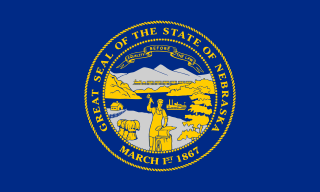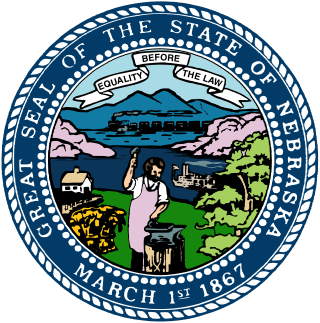Related Research Articles

Nebraska is a triply landlocked state in the Midwestern region of the United States. It borders South Dakota to the north; Iowa to the east and Missouri to the southeast, both across the Missouri River; Kansas to the south; Colorado to the southwest; and Wyoming to the west. Nebraska is the 16th largest state by land area, with just over 77,220 square miles (200,000 km2). With a population of over 1.9 million, it is the 37th most populous state and the 7th least densely populated. Its capital is Lincoln, and its most populous city is Omaha, which is on the Missouri River. Nebraska was admitted into the United States in 1867, two years after the end of the American Civil War. The Nebraska Legislature is unlike any other American legislature in that it is unicameral, and its members are elected without any official reference to political party affiliation.
Capital punishment is a legal penalty in the U.S. state of Nebraska. In 2015, the state legislature voted to repeal the death penalty, overriding governor Pete Ricketts' veto. However, a petition drive secured enough signatures to suspend the repeal until a public vote. In the November 2016 general election, voters rejected the repeal measure, preserving capital punishment in the state. Nebraska currently has 12 inmates on death row.
The State of New Hampshire has a republican form of government modeled after the Government of the United States, with three branches: the executive, consisting of the Governor of New Hampshire and the other elected constitutional officers; the legislative, called the New Hampshire General Court, which includes the Senate and the House of Representatives; and the judicial, consisting of the Supreme Court of New Hampshire and lower courts.
The structure of the judiciary of Texas is laid out in Article 5 of the Constitution of Texas and is further defined by statute, in particular the Texas Government Code and Texas Probate Code. The structure is complex, featuring many layers of courts, numerous instances of overlapping jurisdiction, several differences between counties, as well as an unusual bifurcated appellate system at the top level found in only one other state: Oklahoma. Municipal Courts are the most active courts, with County Courts and District Courts handling most other cases and often sharing the same courthouse.

The government of Florida is established and operated according to the Constitution of Florida and is composed of three branches of government: the executive branch consisting of the governor of Florida and the other elected and appointed constitutional officers; the legislative branch, the Florida Legislature, consisting of the Senate and House; and the judicial branch consisting of the Supreme Court of Florida and lower courts. The state also allows direct participation of the electorate by initiative, referendum, and ratification.

A certified copy is a copy of a primary document that has on it an endorsement or certificate that it is a true copy of the primary document. It does not certify that the primary document is genuine, only that it is a true copy of the primary document.

The Nebraska Supreme Court is the highest court in the U.S. state of Nebraska. The court consists of a chief justice and six associate justices. Each justice is initially appointed by the governor of Nebraska; using the Missouri Plan, each justice is then subject to a retention vote for additional six-year terms. The six associate justices each represent a Supreme Court district; the chief justice is appointed at-large.
The Court of Appeals is the intermediate level appellate court for the US state of Nebraska. The Court was created on 6 September 1991, following a constitutional amendment held in November of the previous year. The Court regularly sits in the Nebraska State Capitol, but sits elsewhere when conveinent.
Hate crime laws in the United States are state and federal laws intended to protect against hate crimes. While state laws vary, current statutes permit federal prosecution of hate crimes committed on the basis of a person's characteristics of race, religion, ethnicity, disability, nationality, gender, sexual orientation, and/or gender identity. The U.S. Department of Justice (DOJ), Federal Bureau of Investigation (FBI), and campus police departments are required to collect and publish hate crime statistics.

This article summarizes the same-sex marriage laws of states in the United States. Via the case Obergefell v. Hodges on June 26, 2015, the Supreme Court of the United States legalized same-sex marriage in a decision that applies nationwide, with the exception of American Samoa and sovereign tribal nations.

The state government of Georgia is the U.S. state governmental body established by the Georgia State Constitution. It is a republican form of government with three branches: the legislature, executive, and judiciary. Through a system of separation of powers or "checks and balances", each of these branches has some authority to act on its own, some authority to regulate the other two branches, and has some of its own authority, in turn, regulated by the other branches. The seat of government for Georgia is located in Atlanta.
The government of Virginia combines the executive, legislative and judicial branches of authority in the Commonwealth of Virginia. The current governor of Virginia is Glenn Youngkin. The State Capitol building in Richmond was designed by Thomas Jefferson, and the cornerstone was laid by Governor Patrick Henry in 1785. Virginia currently functions under the 1971 Constitution of Virginia. It is Virginia's seventh constitution. Under the Constitution, the government is composed of three branches: the legislative, the executive and the judicial.

The government of Vermont is a republican form of government modeled after the Government of the United States. The Constitution of Vermont is the supreme law of the state, followed by the Vermont Statutes. This is roughly analogous to the Federal United States Constitution, United States Code and Code of Federal Regulations respectively. Provision is made for the following frame of government under the Constitution of the State of Vermont: the executive branch, the legislative branch, and the judicial branch. All members of the executive and legislative branch serve two-year terms including the governor and senators. There are no term limits for any office.
A resign-to-run law is a law that requires the current holder of an office to resign from that office before they can run for another office. This is distinct from a dual mandate prohibition, where a person has to resign from their old office to assume the new office, rather than to run for the new office. Resign-to-run laws exist in several jurisdictions, including five US states.

In the United States, each state and territory sets the age of consent either by statute or the common law applies, and there are several federal statutes related to protecting minors from sexual predators. Depending on the jurisdiction, the legal age of consent is between 16 and 18. In some places, civil and criminal laws within the same state conflict with each other.
In the United States, the law for murder varies by jurisdiction. In many US jurisdictions there is a hierarchy of acts, known collectively as homicide, of which first-degree murder and felony murder are the most serious, followed by second-degree murder and, in a few states, third-degree murder, which in other states is divided into voluntary manslaughter, and involuntary manslaughter such as reckless homicide and negligent homicide, which are the least serious, and ending finally in justifiable homicide, which is not a crime. However, because there are at least 52 relevant jurisdictions, each with its own criminal code, this is a considerable simplification.
Same-sex marriage has been legal in Nebraska since June 26, 2015, when the U.S. Supreme Court ruled in the case of Obergefell v. Hodges that the denial of marriage rights to same-sex couples violates the Fourteenth Amendment to the U.S. Constitution. Following the court ruling, Attorney General Doug Peterson announced that the state of Nebraska would comply and recognize same-sex marriages.

Montana District Courts are the state trial courts of general jurisdiction in the U.S. state of Montana. Montana District Courts have original jurisdiction over most civil cases, civil actions involving monetary claims against the state, criminal felony cases, naturalization proceedings, probate cases, and most writs. They may also hear certain special actions and proceedings, and oversee a narrowly-defined class of ballot issues. Montana District Courts also have limited appellate jurisdiction regarding cases that arise in Justice Courts, City Courts, and Municipal Courts as well as Judicial review of decisions by state administrative law tribunals that fall under the Montana Administrative Procedures Act.
The County Courts of the US state of Nebraska are trial courts with a limited jurisdiction. They are located in every county of the State. There are 12 county judge districts, made up of varying counties, with varying numbers of judges assigned to each district.
References
- 1 2 "Separate Juvenile Courts". State of Nebraska Judicial Branch. Retrieved 6 July 2024.
- ↑ "Nebraska Revised Statute Chapter 43 Section 2,112". Nebraska Legislature. Retrieved 6 July 2024.
- ↑ "Nebraska Revised Statute Chapter 43 Section 2,122". Nebraska Legislature. Retrieved 6 July 2024.
- ↑ "Nebraska Revised Statute Chapter 43 Section 247". Nebraska Legislature. Retrieved 6 July 2024.
- ↑ "Nebraska Revised Statute Chapter 43 Section 2,119". Nebraska Legislature. Retrieved 6 July 2024.
- ↑ "Nebraska Revised Statute Chapter 43 Section 2,116". Nebraska Legislature. Retrieved 6 July 2024.